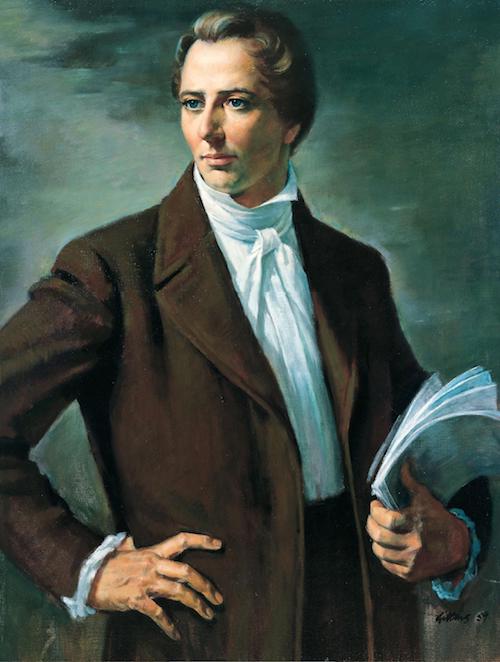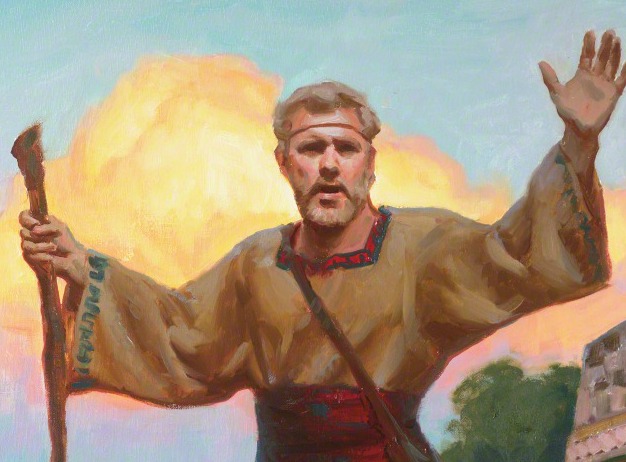
Throughout the history of The Church, there have been many individuals called by God to help lead His children here on Earth. In examining their teachings and mannerisms, it becomes evident that they are all different. Since The Church was founded, some Church leaders have been accused of being too brash, out of touch, or overbearing. We recognize the real pain this can lead to. Such pain begs the question, why does God call these individuals in the first place?
Here’s a defense of God’s offensive apostles.
Related: What are Modern Apostles?
They Don’t Have the Luxury of Teaching Easy Truths
 When the Lord commands something to be taught, His leaders must have the faith to teach it regardless of how they think it will be received. Oftentimes it’s not easy to do.
When the Lord commands something to be taught, His leaders must have the faith to teach it regardless of how they think it will be received. Oftentimes it’s not easy to do.
On February 16, 1832, the Prophet Joseph Smith and Sidney Rigdon received the well-known revelation contained in Doctrine and Covenants 76, commonly referred to as “the Vision.” At the time, the vast majority of Church members were converts from Protestant faiths which preached the widely accepted doctrine of a place in heaven for those who were righteous and consignment to hell for the wicked.
The idea that there were multiple kingdoms in heaven and that salvation may be made available for all didn’t resonate well with many of the members, causing some to apostatize. Even future President of The Church Brigham Young admitted he “could not understand it” at first. However, he and many others eventually prayed to understand the will of the Lord concerning the matter and received a confirming witness by the Spirit that it was indeed a true revelation given by God.
We can learn a valuable lesson from Brigham Young’s example here. When a leader of The Church says something that we may find offensive or difficult to hear, it helps to take a step back and take some time to process everything. If an apostle’s teachings initially appear confusing or painful, the thing to do is pray to God to ask for understanding which He promises to give us in His timing.
Their Reputation Precedes Them
 In both the past and present, certain General Authorities have developed a reputation for choosing to emphasize specific doctrines which, while true, are seen as more controversial or difficult to accept. This may skew our perception of them. When you look at all of their works as a sum whole, it puts their passion and teachings in context, making it far more difficult to accuse them of being intentionally offensive.
In both the past and present, certain General Authorities have developed a reputation for choosing to emphasize specific doctrines which, while true, are seen as more controversial or difficult to accept. This may skew our perception of them. When you look at all of their works as a sum whole, it puts their passion and teachings in context, making it far more difficult to accuse them of being intentionally offensive.
It’s important to understand that God calls imperfect people to lead His Church. Elder Neil A. Anderson described this in a recent General Conference:
The leaders of the Church are honest but imperfect men. Remember the words of Moroni: “Condemn me not because of mine imperfection, neither my father … ; but rather give thanks unto God that he hath made manifest unto you our imperfections, that ye may learn to be more wise than we have been.”
This doesn’t give leaders a license to abuse their office but rather enables us to be more forgiving. What is said about an apostle is not as important as what an apostle says.
Related: What happens if I can’t sustain a church leader?
Personality, Culture, and Presentation Style
 Even if a given teaching is more mainstream, other factors such as differences in culture, personality, and presentation style may still color an apostle as offensive. These concerns were expressed by Enoch. When the Lord called him to be a leader in His church, Enoch protested by telling the Lord, “[I] am but a lad, and all the people hate me…” The Lord responded by saying that He would give Enoch power to preach the gospel. As President Thomas S. Monson once taught, “Whom the Lord calls he qualifies.”
Even if a given teaching is more mainstream, other factors such as differences in culture, personality, and presentation style may still color an apostle as offensive. These concerns were expressed by Enoch. When the Lord called him to be a leader in His church, Enoch protested by telling the Lord, “[I] am but a lad, and all the people hate me…” The Lord responded by saying that He would give Enoch power to preach the gospel. As President Thomas S. Monson once taught, “Whom the Lord calls he qualifies.”
Attributes that are underdeveloped in a leader can be honed and ultimately overcome by the power that the Lord will give them. The weaknesses of His leaders is not sufficient to hinder His work.
God Calls His Prophets

Apostles and prophets are not thrust into their position by chance. The Lord actually chooses them. Why does He do this? It is a mechanic of setting up His kingdom on the earth. His kingdom contains divine doctrines and ordinances that manifest the Lord’s power and are designed to exalt the human soul. Men who are called to the holy apostleship are bequeathed a measure of divine authority to manage both the doctrine and ordinances of the kingdom. If God actually called a given man to such an office, and they satisfy God with their service, then we ought to be similarly satisfied.
Related: Following the Fallible—Sustain Church Leaders
How the Savior Dealt With Offense
One of the most famous leaders ever called by God was the apostle Peter. Peter was beloved and hated. Praised and beaten. He was truly a disciple of Jesus Christ yet there was a time when Peter offended Jesus Christ Himself.
From that time forth began Jesus to shew unto his disciples, how that he must go unto Jerusalem, and suffer many things of the elders and chief priests and scribes, and be killed, and be raised again the third day. Then Peter took him, and began to rebuke him, saying, Be it far from thee, Lord: this shall not be unto thee. But he turned, and said unto Peter, Get thee behind me, Satan: thou art an offense unto me: for thou savourest, not the things that be of God, but those that be of men (Matthew 16:21-23).
How did the Savior respond to an offensive apostle? He loved him and continued to sustain his efforts to do the work of the ministry.
And the Lord said, Simon, Simon, behold, Satan hath desired to have you, that he may sift you as wheat: But I have prayed for thee, that thy faith fail not: and when thou art converted, strengthen thy brethren (Luke 22: 31-32).
Though it may be difficult, following the Savior’s example is surely the way to go.





